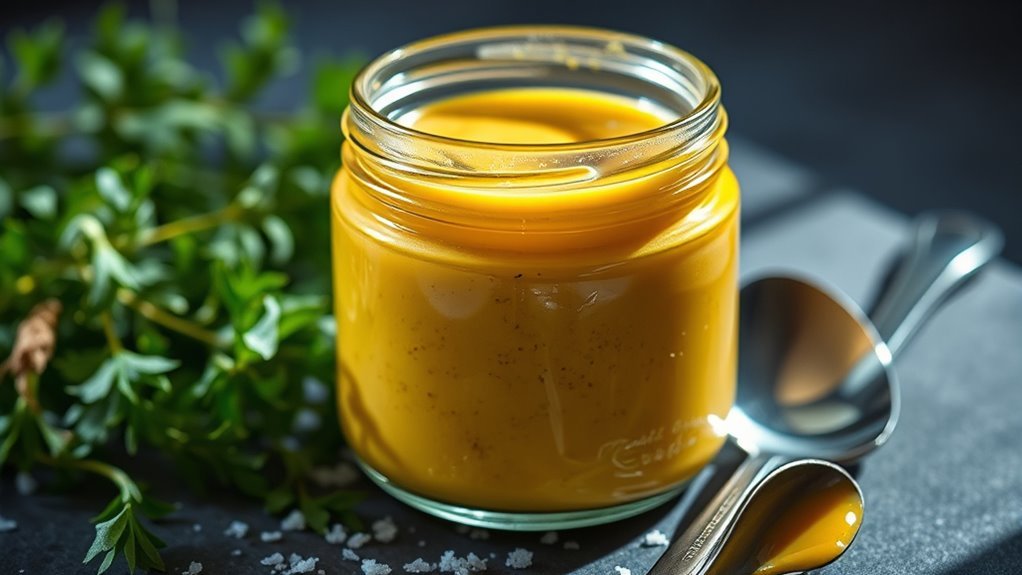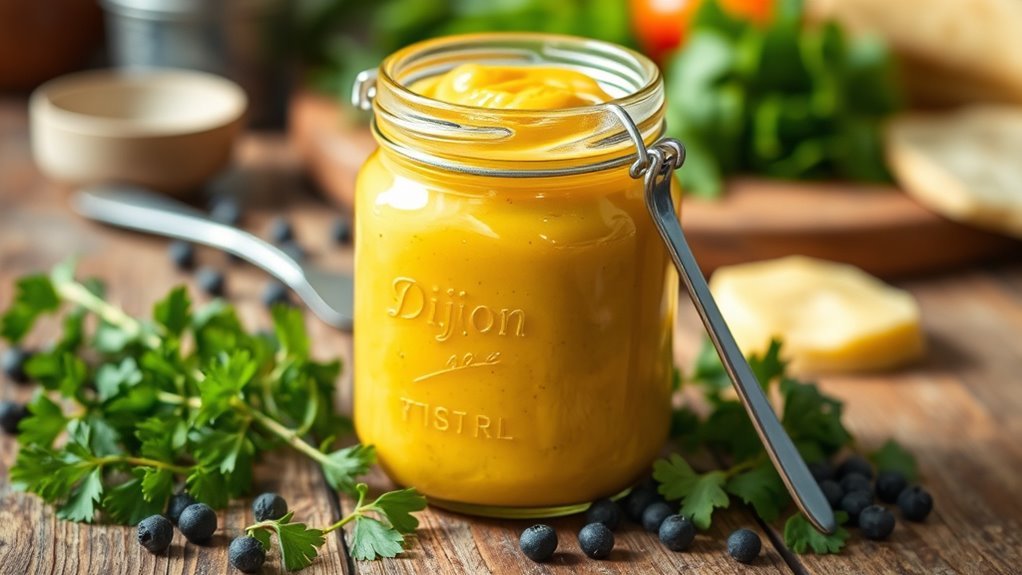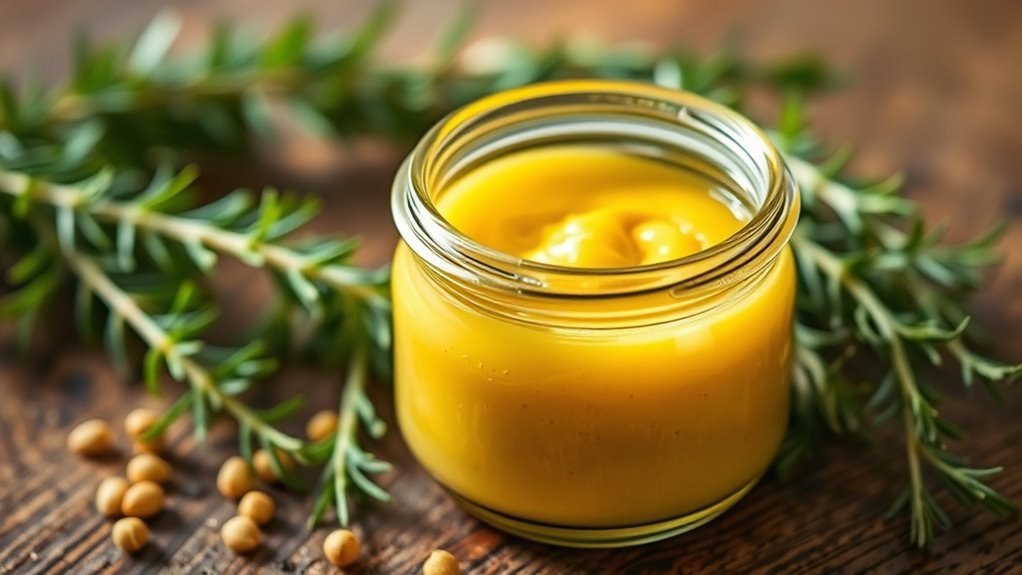Yes, Dijon mustard is keto-friendly! It contains only about 5 calories and 1 gram of carbs per teaspoon, making it a great option for a low-carb diet. It’s packed with antioxidants and essential minerals like selenium and magnesium while adding bold flavor without sugars or fats. Just be sure to check labels for any additives that could impact your keto goals. If you want to know how to incorporate it into your meals, keep going!
Nutritional Profile of Dijon Mustard

When considering the nutritional profile of Dijon mustard, it’s important to recognize its low-calorie and low-carb content, making it a popular choice for those on a keto diet. This mustard generally contains about 5 calories per teaspoon, with minimal carbohydrates, allowing you to enjoy its bold flavor without derailing your dietary goals. The nutritional benefits extend beyond just calorie count; Dijon mustard is rich in antioxidants and contains essential minerals like selenium and magnesium. Its unique flavor profile adds a zesty kick to dishes, enhancing the taste without adding unwanted sugars or fats. By incorporating Dijon mustard into your meals, you can enjoy a flavorful, guilt-free condiment that aligns with your health-focused lifestyle.
Carb Content in Dijon Mustard

How many carbs are in Dijon mustard, and how does that fit into your keto lifestyle? Generally, Dijon mustard contains about 1 gram of carbs per teaspoon, making it a low-carb condiment choice. This carb content can be easily incorporated into your daily macros without compromising ketosis. Here are some points to evaluate:
- Check Labels: Different mustard varieties may have varying carb sources; always read the nutrition label.
- Serving Size: A little goes a long way, so monitor the amount you use.
- Pairing Options: Dijon mustard pairs well with meats and salads, enhancing flavor without adding significant carbs.
- Versatility: It’s a great addition to marinades and dressings, keeping your meals exciting on keto.
Health Benefits of Dijon Mustard

Dijon mustard isn’t just a flavorful condiment; it also offers several health benefits. It’s nutrient-dense, providing essential vitamins and minerals while remaining low in calories. Plus, its antioxidant properties can help combat oxidative stress in your body.
Nutrient Density Overview
Mustard, often overlooked as a mere condiment, offers a surprising array of health benefits, particularly in its Dijon variety. This mustard is not just flavorful; it’s a nutrient-dense option that provides several important health advantages. Here are some key nutrient sources found in Dijon mustard:
- Low in Calories: A small serving packs flavor without excessive calories.
- Rich in Antioxidants: Contains compounds that may support overall health.
- Vitamins and Minerals: Offers essential nutrients like selenium and magnesium.
- Digestive Health: May aid digestion due to its mustard seed content.
Utilizing various mustard varieties like Dijon can enhance both your meals and your nutrient intake, making it a smart addition to your keto-friendly diet.
Antioxidant Properties Explained
Antioxidants play an essential role in protecting your body from oxidative stress, and Dijon mustard is packed with these beneficial compounds. The mustard compounds found in Dijon, such as glucosinolates, contribute to its impressive antioxidant benefits. These compounds help neutralize free radicals, reducing the risk of chronic diseases and promoting overall health. By incorporating Dijon mustard into your meals, you can boost your antioxidant intake without added sugars or carbs, making it a smart choice for those following a keto diet. Additionally, the presence of other nutrients in mustard enhances its ability to fight inflammation and support your immune system. So, if you’re looking for a flavorful way to enhance your diet, Dijon mustard is an excellent option.
Low-Calorie Condiment Choice
When you’re looking for a flavorful yet low-calorie condiment to enhance your meals, Dijon mustard stands out as an excellent choice. Its low calorie benefits make it a guilt-free option to add zest without compromising your diet. Here are some ways Dijon mustard showcases its condiment versatility:
- Salad Dressings: Mix with olive oil for a tangy vinaigrette.
- Marinades: Use it to tenderize and flavor meats.
- Sandwich Spread: Substitute mayo for a lighter option.
- Baking Ingredient: Add to recipes for an unexpected kick.
With its rich flavor and minimal calories, incorporating Dijon mustard into your meals not only elevates your dishes but also supports your health goals. Enjoy the freedom of flavor without the extra calories!
How to Incorporate Dijon Mustard Into Your Keto Diet
Incorporating Dijon mustard into your keto diet can enhance flavor without adding significant carbohydrates. You can create a delicious Dijon dressing to drizzle over salads, adding a tangy kick that complements leafy greens and avocados. Another great option is using mustard marinades for meats; simply mix Dijon with olive oil, herbs, and spices to marinate chicken or pork before grilling. This not only infuses flavor but also keeps your meals exciting. You can also stir a spoonful into soups or sauces to deepen their taste without compromising your carb limits. By incorporating Dijon mustard creatively, you can enjoy diverse meals that align with your keto lifestyle while satisfying your taste buds.
Potential Ingredients to Watch Out For
While Dijon mustard is generally low in carbohydrates, it’s important to watch out for certain ingredients that can sneak into some brands. These can affect your keto diet and overall health. Here are four potential ingredients to be cautious of:
Be mindful of ingredients in Dijon mustard that could disrupt your keto diet and health.
- Sugar Substitutes: Some brands use sugar substitutes that may not align with your keto goals.
- Ingredient Additives: Preservatives and artificial flavors can impact your health, so read labels carefully.
- Modified Starch: This thickening agent can add unwanted carbs.
- Excessive Sodium: Some mustards may have high sodium levels, which can be a concern for overall health.
Staying vigilant about these ingredients will help you choose a Dijon mustard that fits your keto lifestyle.
Alternatives to Dijon Mustard on Keto
If you’re looking for alternatives to Dijon mustard on a keto diet, there are several low-carb mustard options available. Additionally, making homemade mustard can be a fun and customizable way to meet your dietary needs. Exploring these alternatives can help you maintain flavor while staying within your carb limits.
Low-Carb Mustard Options
When you’re following a keto diet, finding suitable low-carb alternatives to Dijon mustard can be essential for flavoring your meals without derailing your carb count. Here are some low-carb mustard options that can fit seamlessly into your diet:
- Yellow Mustard: A classic condiment, it contains minimal carbs and adds a tangy flavor.
- Spicy Brown Mustard: Offers a bolder taste, and is also low in carbs, making it a great choice for meats.
- Garlic Aioli: A creamy, keto-friendly sauce that pairs well with veggies and meats.
- Horseradish Sauce: Provides a spicy kick with very few carbs, perfect for steak or seafood.
These low carb condiments can enhance your meals while keeping you aligned with your keto goals.
Homemade Mustard Recipes
For those following a keto diet, homemade mustard can be a flavorful alternative to store-bought Dijon mustard while allowing you to control the ingredients and carb content. You can easily create homemade variations by mixing ground mustard seeds with vinegar and water. Adjust the thickness by adding more or less liquid to suit your taste. To add flavor enhancements, consider incorporating spices like garlic powder, turmeric, or even a splash of hot sauce for a kick. This way, you can enjoy mustard without the hidden sugars often found in commercial brands. Plus, making your own mustard is simple and can elevate your meals, giving you the freedom to customize flavors according to your preferences.
Frequently Asked Questions
Can I Eat Dijon Mustard Without Exceeding My Carb Limit?
You can definitely enjoy Dijon mustard without exceeding your carb limit, as long as you keep an eye on the serving size. Typically, a teaspoon contains about 0.3 grams of carbs, making it a low-carb option. Just remember to check the specific brand you’re using, as carb counts can vary slightly. By measuring your portions, you can savor the flavor without worrying about your daily carb intake. Enjoy your meals!
Does Dijon Mustard Contain Any Hidden Sugars?
Dijon mustard can be like a treasure chest, hiding some unexpected ingredients. While it’s generally low in sugar, it’s wise to check the nutritional breakdown for hidden sugars. Some brands might add sweeteners or other hidden ingredients that can sneak in extra carbs. Always read the label closely to guarantee you’re sticking to your dietary goals. Staying informed gives you the freedom to enjoy your favorite condiments without worry.
Is Homemade Dijon Mustard Keto-Friendly?
When you make homemade Dijon mustard, you can control the ingredients, which helps avoid hidden sugars often found in store-bought versions. The benefits of homemade mustard include customization and freshness, allowing you to experiment with dijon mustard recipes that fit your dietary needs. If you keep it simple, using mustard seeds, vinegar, and spices, you’ll create a delicious condiment that aligns with your health goals, making it a great option for your meals.
Can Dijon Mustard Trigger Any Allergies?
When it comes to mustard allergies, you might find yourself in a pickle. Though Dijon mustard is generally safe for most, some folks have ingredient sensitivities that can lead to allergic reactions. Common allergens in mustard can include mustard seeds, vinegar, and preservatives. If you’re unsure, it’s best to consult a healthcare professional. Always read labels carefully to avoid any unexpected surprises, especially if you’ve had reactions to mustard or related ingredients before.
How Long Does Dijon Mustard Last Once Opened?
Once opened, Dijon mustard typically lasts about 6 to 12 months when stored properly. To maximize its shelf life, keep it refrigerated and tightly sealed. You’ll want to avoid contamination by using clean utensils each time. If you notice any changes in color, texture, or smell, it’s best to discard it. Following these storage tips can help guarantee your mustard stays fresh and flavorful for your culinary creations.
Frequently Asked Questions about Dijon Mustard and Keto Diet
1. Is Dijon mustard keto-friendly?
Yes, Dijon mustard is generally considered keto-friendly. It is low in carbohydrates, with approximately 1 gram of carbs per teaspoon. This makes it a suitable condiment for those following a ketogenic diet, as it adds flavor without significantly impacting your carb intake.
2. What are the nutritional benefits of Dijon mustard?
Dijon mustard is low in calories and contains various beneficial nutrients. It is rich in antioxidants and provides small amounts of vitamins and minerals, including vitamin C, calcium, and magnesium. Additionally, it may have anti-inflammatory properties and can aid in digestion.
3. Does Dijon mustard contain any sugars?
Most Dijon mustard varieties contain minimal sugar, typically less than 0.5 grams per teaspoon. However, it’s essential to check the label, as some commercial brands may add sugar or other sweeteners. Opting for organic or homemade Dijon mustard can help ensure it aligns with your keto diet.
4. Can I use Dijon mustard in keto recipes?
Absolutely! Dijon mustard can be used in a variety of keto recipes, such as salad dressings, marinades, and sauces. It adds a tangy flavor and can enhance the taste of many dishes while keeping the carb count low. Just be mindful of other ingredients you pair it with to maintain your keto goals.
5. Are there any keto-friendly alternatives to Dijon mustard?
Yes, if you’re looking for alternatives, you can consider stone-ground mustard, yellow mustard, or even homemade mustard recipes that use low-carb ingredients. These options can provide similar flavors without breaking your keto diet. Always check the labels for added sugars or high-carb ingredients.
References
- https://www.healthline.com/nutrition/keto-diet-foods
- https://www.medicalnewstoday.com/articles/keto-diet-foods
- https://www.ncbi.nlm.nih.gov/pmc/articles/PMC7074078/
- https://www.wholegrainscouncil.org/whole-grains-101/what-are-whole-grains
- https://www.hopkinsmedicine.org/health/wellness-and-prevention/the-keto-diet
- https://www.eatright.org/health/wellness/healthy-eating/the-ketogenic-diet
- https://www.ncbi.nlm.nih.gov/pmc/articles/PMC6320442/
- https://www.sciencedirect.com/science/article/pii/S0899900719301953


